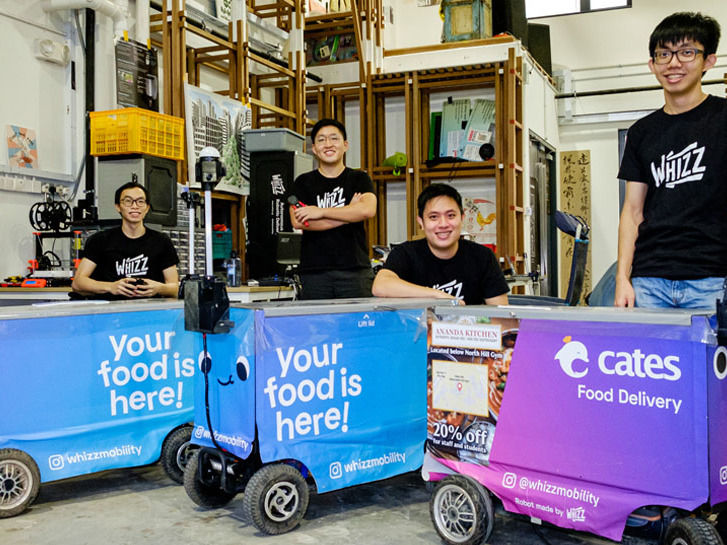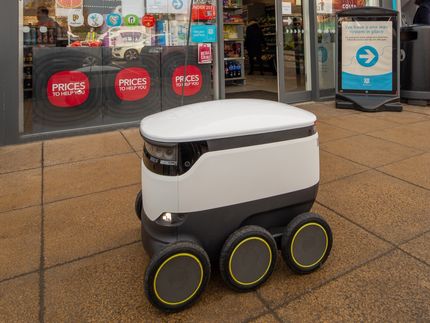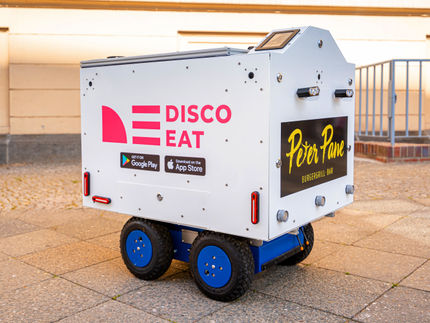Start-up builds robots for pandemic-proof food delivery
A student start-up at Nanyang Technological University, Singapore (NTU Singapore) has developed a fleet of self-driving robots that deliver in a smarter, greener and contactless manner, making it a safe option in a pandemic.

NTU Singapore student start-up builds robots for pandemic-proof delivery
Nanyang Technological University, Singapore (NTU Singapore)
Called the FoodBot, these four-wheeled electronically powered robots have delivered over 6,000 lunch and dinner orders on the NTU campus since June 2020 – when Singapore started Phase 1 of its exit from the circuit breaker. Its pilot is carried out with Cates, a food delivery mobile app developed by Wecome, another start-up that was incubated in NTU.
FoodBot is the brainchild of Whizz Mobility, a student start-up that grew out of the Renaissance Engineering Programme (REP), NTU’s flagship interdisciplinary undergraduate engineering programme. The first prototype was designed and built on the NTU Smart Campus, a living testbed of new technologies. Whizz Mobility now operates out of a maker’s space at the Launchpad @ Jurong Innovation District, which is located next to the NTU campus at CleanTech Park.
Each FoodBot is designed to carry a 50kg load. It travels at a safe speed of 5km/h – the average human pedestrian walking speed – on pre-mapped delivery routes. Its onboard cameras and algorithms developed by the REP students help it to navigate around people and objects.
The footage captured on the cameras is fed to the algorithms to constantly improve on their performance. A supervisory team at Whizz remotely monitors the camera feed in real time so they can take control of the robots’ movements where necessary, usually for safety reasons.
Melvin Foo, a third-year REP student and founder and CEO of Whizz Mobility, said: “The FoodBot represents a cleaner and smarter delivery alternative on the market, and is an engineering dream for us. Almost every part of the robot is made by us, from 3D printed parts to self-designed custom printed circuit boards. We also wrote our own robotic software, fleet management software, and algorithms.
“The process of developing FoodBot has been a humbling experience, and we are grateful for the resources, mentorship and support we have received from NTU, such as the Student Entrepreneurship Programme under NTU’s School of Computer Science and Engineering.”
NTU Deputy President and Provost Professor Ling San said: “The FoodBots built by Whizz Mobility is a wholly made-in-NTU product, and is a prime example of innovation, interdisciplinary collaboration, and an entrepreneurial mindset – all of which are goals under the recently announced NTU 2025 strategic plan. It also shows how the NTU Smart Campus is the ideal place to research and testbed new smart technologies to enrich and improve the way we learn, work, and live.”
Devouring a slice of the food delivery market
Whizz was first launched in 2018 with an autonomous scooter prototype that bagged two out of five prizes at the 2019 Youth Innovation Awards organised by the Infocomm Media Development Authority (IMDA). However, the Personal Mobility Device regulations that were introduced later by the Singapore authorities forced them to rethink their direction.
By December 2019, the team of eight students – seven from NTU and one from the Singapore University of Technology and Design (SUTD) – had pivoted into the food delivery market with FoodBot. The move proved to be timely, with food deliveries in demand due to the COVID-19 outbreak. They built their first robot during the circuit breaker in April last year, and the fleet has since grown to five robots.
Since the pilot delivery service began in June 2020, Whizz’s delivery robots have been plying selected routes on the NTU campus, where deliveries are more efficiently done by robots than by human labour. More recently, the FoodBots have been making deliveries out of campus to the nearby CleanTech Park.
A user simply needs to order food through the Cates mobile app and select which location to collect the food from. Once the order is ready, the merchant loads it into a FoodBot that is parked near the canteen or restaurant. The robot then travels to the selected collection point.
As an extension of the pilot, the fleet of five robots are now also delivering bubble tea ordered through Cates to selected locations on campus from 3pm to 4pm.
Whizz is now in talks with food and beverage partners on potential collaborations and is exploring the option of extending its delivery services to non-food partners, and working with more testbed partners, facilitators and aggregators.
The start-up is also looking to grow its team, which currently include NTU students Victor Gwee, Zechary Hoe, Herh Peng Leng, Lakshyajeet Dwivedee, and SUTD student Ho Rui En.





























































